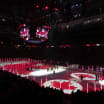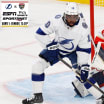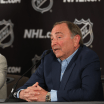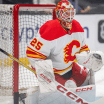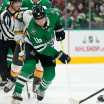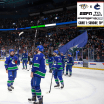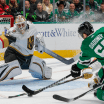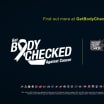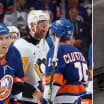Winter Classic between Bruins, Penguins stirs NHL memories for Johnston
Current Pittsburgh adviser, former coach, GM, played 11 seasons in Boston goal
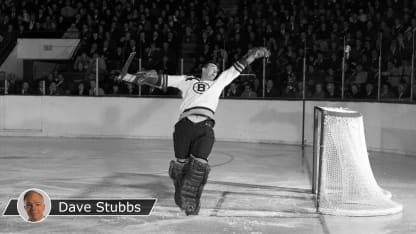
But Johnston fondly remembers the scraps of flimsy equipment he struggled into and strapped on, pushed into the net by older brothers and neighborhood Rocket Richard wannabes who treated him like so much cannon fodder.
"An outdoor rink on Plymouth Grove," he said of a street that was bulldozed more than a half-century ago to make way for an autoroute. "There was a little shack you'd go into to warm up. They were very cold days."
Johnston had no clue, his fingers and toes frozen, that he would one day play NHL goal in the Montreal Forum, home of the Canadiens and one of hockey's most historic buildings, which was a 20-minute walk from his outdoor rink.
Eddie Johnston watches a 3ICE Hockey tryout session at Orleans Arena on April 19, 2022 in Las Vegas. Steph Chamber, 3ICE, Getty Images
More than seven decades later, Johnston expects flashbacks to those bone-chilling days when he watches the 2023 Discover NHL Winter Classic at Boston's Fenway Park between the Boston Bruins and Pittsburgh Penguins on Jan. 2 (2 p.m. ET, TNT, SN, TVAS).
Even with a championship history with both teams, his allegiance will be clear.
"I'd have to say I'm cheering for Pittsburgh for the simple reason that I'm still affiliated with them," said Johnston, for the past 16 years a senior adviser with the Penguins and a member of the organization for four decades.
Johnston broke into the NHL with Boston in 1962, playing 11 memorable seasons in goal from 1962-73. A member of Stanley Cup championship teams in 1970 and 1972, he went on to play with the Toronto Maple Leafs, St. Louis Blues and Chicago Black Hawks, retiring after four games with Chicago in 1977-78.
Pittsburgh Penguins senior advisor Eddie Johnston presses the Stanley Cup overhead at Detroit's Joe Louis Arena on June 12, 2009 following the Penguins' Game 7 Stanley Cup Final win against the Detroit Red Wings. Jim McIsaac, Getty Images
For the past nearly 50 years, Johnston has held an NHL record that surely is untouchable: he is the last goalie to play every minute of a schedule, all 70 Bruins games in 1963-64.
"They were great years that I enjoyed," he said of his time in Boston, much of it shared in goal with his dear friend Gerry Cheevers. "To be part of a couple of Cup-winning teams was terrific."
Johnston played 592 games, going 236-256 with 78 ties, a 3.25 goals-against average, .896 save percentage and 32 shutouts, playing on some weak teams along with two champions. He is especially proud of his 1972 Stanley Cup Playoff run: 6-1 with a 1.86 GAA, .936 save percentage and one shutout.
He is tied for third all-time among Bruins goalies for games played (444), and fourth in starts (429). He is sixth in wins (182), fifth in shutouts (27) and shares the Boston record for goalie assists in a season (four, 1971-72) with Cheevers (1976-77) and Jaroslav Halak (2018-19).
Eddie Johnston smothers the puck in his glove during a 1963-64 game at Maple Leaf Gardens, watched by Toronto forward Bob Pulford. Graphic Artists/Hockey Hall of Fame
But E.J., as he's been called since boyhood, is best known in hockey for his post-playing roles with the Penguins, having seemingly done everything in Pittsburgh but resurface the ice.
Apart from a three-season detour to the Hartford Whalers, when he served as general manager from 1989-92, Johnston has been a member of the Penguins family since 1980.
He has been coach (1980-83, 1993-97), general manager (1983-88), assistant GM (1989, 1997-2006) and since 2006 senior advisor to the hockey operations department. In 2009, his name was engraved on the Stanley Cup for a third time following the Penguins' championship win against the Detroit Red Wings.
Most memorably, in his mind and those of Penguins fans, Johnston's greatest moment in Pittsburgh came at the 1984 NHL Draft at the Montreal Forum when he oversaw the Penguins' selection of Mario Lemieux with the No. 1 pick.
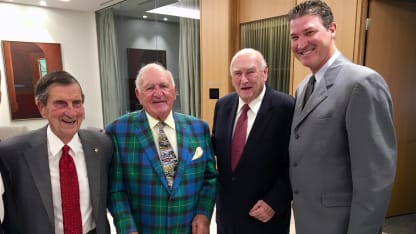
From left, Ted Lindsay, Bobby Baun, Eddie Johnston and Mario Lemieux at the 2017 NHL Alumni Gala in Toronto. Dave Stubbs, NHL.com
"I had some unbelievable offers," he remembered of other teams eager to empty their cupboards in exchange for that No. 1 selection.
Indeed, Minnesota GM Lou Nanne reportedly promised Johnston every pick the North Stars held in that draft. The Philadelphia Flyers were ready to break the bank; the Canadiens, Lemieux's hometown team, and Quebec Nordiques aggressively pursued the promising French-Canadian star, a priceless commodity.
But Johnston resisted every offer to trade the No. 1 pick, feeling pressure even from within his own organization.
"Guys like Mario come around once in a lifetime," Johnston said, recalling his conversations with then-Penguins owner Edward DeBartolo that always came back to his keeping Lemieux at all costs.
Three of Eddie Johnston's Boston Bruins hockey cards, including his famous mad-scientist O-Pee-Chee of 1969-70. At center is his 1970-71 Topps, at right his 1971-72 O-Pee-Chee.
"The first time Mr. DeBartolo came to practice and saw Mario, he said to me, 'Thank God you didn't listen to all those people who wanted you to trade him.'"
Of course, Super Mario would be All-Universe on his way to the Hockey Hall of Fame, finishing with 1,723 points (690 goals, 1,033 assists) in 915 games in 17 seasons with the Penguins.
Lemieux won the Calder Trophy as NHL rookie of the year in 1984-85; led the Penguins to the Stanley Cup in 1991 and 1992, each time voted winner of the Conn Smythe Trophy as most valuable player in the postseason; six times won the Art Ross Trophy as the leading point-scorer in the NHL; three times was voted winner of the Hart Trophy as NHL MVP; and four times was voted winner of the Ted Lindsay Award as most outstandnig player as chosen by members of the NHL Players' Association.
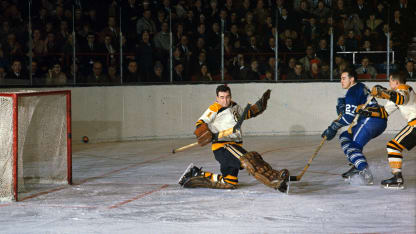
Eddie Johnston watches a shot by Toronto's Frank Mahovlich sail wide of the net, Bruins forward Johnny McKenzie in pursuit during a mid-1960s game at Maple Leaf Gardens. Turofsky/Hockey Hall of Fame
The inspirational soul of the Penguins won hockey games and his own life-threatening battle with Hodgkin's lymphoma, then with investors who bought the Penguins out of bankruptcy in 1999 and cemented their future.
As assistant GM, Johnston played a role in the Penguins drafting forwards Sidney Crosby and Evgeni Malkin, defenseman Kris Letang and goalie Marc-Andre Fleury, cornerstones of Pittsburgh's 2009, 2016 and 2017 championships.
Today, at age 87, he attends every Pittsburgh home game at PPG Paints Arena, about 20 minutes from his home, and is available to the coaching staff or anyone in the front office should they wish to tap into his wisdom.
Johnston's encyclopedic education in the game began in the vapour-breath of Montreal's cold outdoors, days that he recalls with great affection.
Eddie Johnston, age 9 in 1944, at home in Montreal with his brothers. From left: Steve, Eddie, Mike, Billy, David and Tom; Johnston defends Toronto's net with Bob Neely, Boston's Don Marcotte nearby during March 16, 1974 action at Maple Leaf Gardens. Courtesy Eddie and Diane Johnston; Graphic Artists/Hockey Hall of Fame
One of six brothers, he attended St. Thomas Aquinas High School, his first indoor hockey played at the Forum during annual scholastic tournaments. He'd be scouted while playing in the same goal crease patrolled by future Canadiens Hall of Famers Bill Durnan and Jacques Plante, moving into junior leagues on a handful of teams that included the Montreal Royals.
At the Forum he might pick up the odd scrap of discarded goalie equipment, wearing hand-me-downs for years.
Early in his junior career, the Canadiens hired him as a goalie for practices, Plante at the other end of the rink, paying him $1 per scrimmage.
Johnston never could have imagined that two decades later, he would be traded in May 1973 by Boston to Toronto to complete a March deal in which the Bruins had received Plante, who had moved on to the Nordiques of the World Hockey Association as GM and coach.
Eddie Johnston, front row far left, with the 1957-58 Shawinigan Cataractes of the Quebec Hockey League. The Cataractes won the Thomas O'Connell Memorial Trophy as league champions. Macdonald Stewart/Hockey Hall of Fame
"If I was on Rocket Richard's team and we won the scrimmage, Rocket would invite me to Toe Blake's tavern for a beer. But if we lost, he told me I'd better not show my face," Johnston said, laughing, recalling his barely legal drinking-age visits to the popular watering hole that Blake, the former Canadiens forward and soon-to-be coach, had opened near the Forum.
Johnston left home in his mid-teens, bouncing from one team to another, billeted by French-Canadian families. In Quebec's hinterland, places like Trois-Rivieres and Chicoutimi, his hosts spoke not a word of English.
"The real good thing about that is that I learned to speak French fluently," he said.
Even in his youth, Johnston was resourceful in making a dollar. He loved boxing, so he'd fight in small towns outside of Montreal against local toughs and sometimes prison inmates, using assumed names given to him by his older brothers for three- and five-round undercard bouts that paid $2 a round.
Sprawling Eddie Johnston of the Montreal Junior Canadiens watches a puck slide past the net against the Toronto Marlboros during 1956 Eastern Canada Junior A championship-series action at Maple Leaf Gardens, Toronto's Bob Pulford at the edge of the net. Turofsky/Hockey Hall of Fame
He hung wallpaper, had a paper route in his neighborhood, delivered groceries for a dime tip, a quarter if a customer was generous.
With his older brother, Billy, he was a pin boy at the bowling alley of the Montreal Amateur Athletic Association; the Montreal Hockey Club, affiliated with the MAAA, won the inaugural Stanley Cup in 1893.
Later on, in the summertime, Johnston played fastball in a city league for Dow Brewery, paid about $100 a week.
The native Montrealer was Canadiens property but never had a chance with a team that had depth in goal and whose management offered him shallow promises while burying him in the minors. He was sold to the Black Hawks in September 1959, but with Glenn Hall in Chicago's net and the six NHL teams each using a single goalie, that was another dead end.
Eddie Johnston, front row far right, with the 1960-61 Hull-Ottawa Canadiens of the Eastern Professional Hockey League. Sitting beside him is future Montreal Canadien Bobby Rousseau. Also in the front row: captain Al MacNeil and general manager Sam Pollock. The Canadiens won the Tom Foley Memorial Trophy as league champions. Macdonald Stewart/Hockey Hall of Fame
So he slid back into the minor pros with the Canadiens. His work as an apprentice, already having seen him play in Winnipeg, Edmonton and Shawinigan, Quebec, now moved on to Johnstown, Pennsylvania, Hull-Ottawa and Spokane, Washington.
Johnston's big break came in the 1962 NHL interleague draft, the Bruins plucking him from Spokane of the Western Hockey League when the Canadiens left him unprotected.
His start in Boston was a little rough, coach Phil Watson high on goalie Bobby Perreault. But Milt Schmidt, who replaced Watson 14 games into the 1962-63 season, threw his support to Johnston, who played 50 games that season.
Eddie Johnston of the Montreal Junior Canadiens makes a save against the Toronto Marlboros during 1956 Eastern Canada Junior A championship-series action at Maple Leaf Gardens. Turofsky/Hockey Hall of Fame
"Confidence meant everything," the goalie said in a January 1964 Montreal Gazette interview. "When Milt took over as coach and gave me a chance, he said the job was mine unless I let somebody take it away from me.
"I've tried to work hard at it. I've watched Glenn Hall's moves and got a few tips from (Montreal's) Gump Worsley, but I'm not kidding myself. This is a tough league."
As was Johnston, who played every game of the 1963-64 season despite having had no business being in the net on many nights.
He jokes about having had his nose broken three times in 10 days, checking into a Boston hospital where leeches were placed on his eyes to reduce swelling, then playing the next night and beating the Black Hawks.
Rookie Eddie Johnston and teammate Warren Godfrey in the Boston Bruins dressing room at the Montreal Forum during the 1962-63 season; on the ice during the early 1970s with the Bruins. Alain Brouillard/Hockey Hall of Fame; Lewis Portnoy/Hockey Hall of Fame
He had his earlobe almost sliced off by a skate, had it reattached with stitches in the dressing room and immediately skated back into action; he had a toe broken and still didn't miss a second.
"Goalies all wore No. 1 on our sweaters in those days. That was our IQ, too," Johnston said, laughing again.
In 1966, he was asked by the father of an incoming Bruins defenseman prospect to take a boy under his wing. And so it was that 18-year-old Bobby Orr moved in with Johnston, much as Crosby as a rookie would live for a time with Lemieux and his family.
The bond between Johnston and Orr was immediate, up to and beyond the horrible warmup mishap in Detroit on Oct. 31, 1968, Orr drilling the goalie in the temple with a slap shot.
Boston Bruins goalie Eddie Johnston watches the action with defenseman Bobby Orr and Toronto's John Brenneman during a 3-3 tie at Maple Leaf Gardens on Oct. 29, 1966. Graphic Artists/Hockey Hall of Fame
Blood clots would form in Johnston's brain, a priest standing by to administer last rites. For six weeks he would slip in and out of consciousness, no teammate spending more time at his bedside than a devastated Orr.
Not only did Johnston survive the injury, he returned to play again just two months later. Together, he and Orr, Johnston's friend for life who is the godfather of his eldest son, Eddie Jr. (E.J. like his father), won Stanley Cup titles in 1970 and 1972.
The brush with death was just another flesh wound in this goalie's remarkable body of work, sutures and stories stitching it all together.
Johnston loves to tell an unmasked-era thigh-slapper about Gordie Howe and Ted Lindsay, two take-no-prisoners Red Wings.
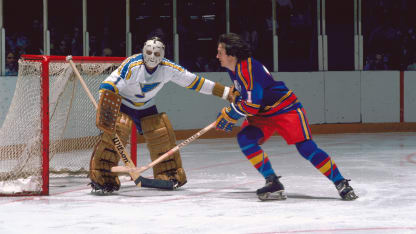
St. Louis Blues goalie Eddie Johnston defends the net against Norm Dube of the Kansas City Scouts on March 14, 1975 during a game at St. Louis Arena. Lewis Portnoy/Hockey Hall of Fame'
"The puck goes back to (Detroit) defenseman Doug Barkley one night, Ted gives me a little jab in the back of the leg with his stick, I go up in the air and get hit right between the eyes with Barkley's shot. It cuts me for about 20 stitches, the game held up while I'm repaired," Johnston said.
"Second period, I give Ted a two-hander that put him out of action for about two weeks. A minute and a half to go in the game, I freeze the puck in the crease and Gordie skates by and gives me a little tap, cutting me for another dozen stitches, and says, 'That's for Ted.'"
Today, Johnston considers that he's had many more blessings than injuries. He cherishes Diane, his wife of 53 years -- "She was the boss then, and she's the boss now" -- their children, Michelle, E.J. and Joseph, grandchildren Lacey, Aiden, Jacob and Mason, and a warehouse of memories.
"I never thought I'd last as long in the game as I have," he said. "I've been blessed."
When the puck drops at Fenway Park for the Winter Classic, a small part of Johnston will be 300 miles north on a long-gone outdoor rink in Montreal. In his mind, he'll be back on a hometown sheet flooded by a park attendant's hose and groomed by boys with shovels, where his life in hockey began on Plymouth Grove's pure, perfect ice.
Top photo:Boston Bruins goalie Eddie Johnston makes a balletic 1967 glove save against Toronto at Maple Leaf Gardens. Graphic Artists/Hockey Hall of Fame
